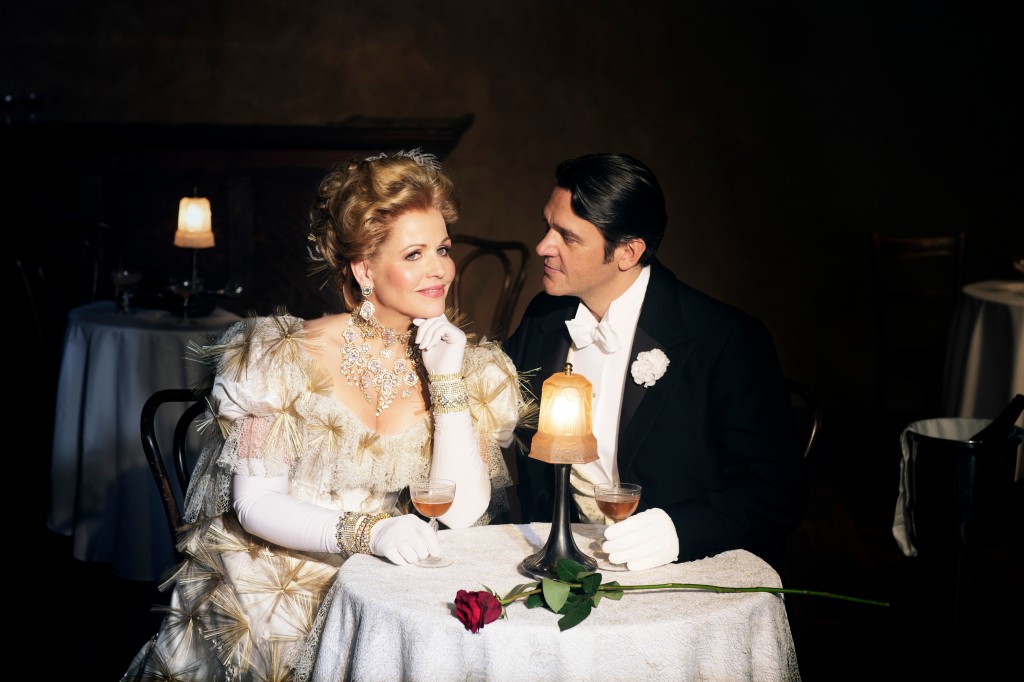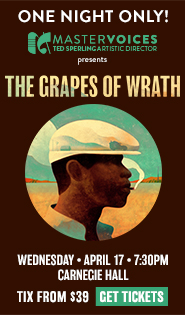Champagne goes a bit flat in Met’s new “Merry Widow”

Renée Fleming and Nathan Gunn in Franz Lehár’s “The Merry Widow” at the Metropolitan Opera.
Photo: Brigitte Lacombe
In some ways, operetta seems a natural choice for a New Year’s Eve gala–the emotional investment required is relatively low, and even with a normal curtain time, you can usually count on the piece to be over with plenty of time to spare before the big countdown.
But the light-hearted elegance of the form can be difficult to pull off, especially in a house designed to present grand opera to almost four thousand. The Metropolitan Opera’s new production of Franz Lehár’s The Merry Widow, which rang in 2015 on Wednesday, felt flat from the start.
The new staging by Tony winner Susan Stroman is commendable mostly for its choreography. The group waltz that opened the first act was a joy to watch, a fluid and impeccably timed piece of clockwork, while the grisettes’ can-can in Act 3, complete with chorus girls flown in by wire, easily stole the show. The transition to Maxim’s dance hall was itself a feat, accomplished dazzlingly before our eyes during the entr’acte.
Elsewhere, Stroman struggled to enliven the scenario. The story came through without much fuss–a young and wealthy widow, assailed on all sides by gold-digging suitors, finally finds true love in the person of a prickly former flame. William Ivey Long’s plush costumes are nice enough to look at, but Julian Crouch’s sets, relying heavily on lavishly painted cutouts, give the stage a candied veneer.
Jeremy Sams’ translated libretto is more successful than either of his previous attempts for the company, 2011’s baroque pastiche The Enchanted Island and last year’s Die Fledermaus. Here his lyrics have a spry comedy of their own, with a wit that enlivens the text. He struggles occasionally in the faster numbers, scrambling to catch a rhyme as it whizzes by, but his quick wordplay elicits far more grins than groans.
This new production was intended as another star vehicle for Renée Fleming, but she was only intermittently up to the task of the titular widow, Hanna on opening night. It’s hard to predict where the soprano will sound tired these days, but the phenomenon is unfortunately not infrequent. In the first act she was often inaudible, and there were barbs and bare patches here and there in her voice. Even the second-act chestnut “Vilja” failed to transport.
At her best, though, Fleming brought up remembrances of her glory days as the prima donna of the Met’s stage. In the third-act duet that reprises her romantic waltz, she finally gave us her full, blooming voice, filling and enveloping the house. Her best singing came in “Whenever I’m lost or lonely,” an aria interpolated from Lehár’s Paganini. The writing is not terribly creative, but the number served its purpose, giving Fleming one last opportunity to soar, which she did not pass up.
Kelli O’Hara was a wonderful surprise, making not just her house debut, but her operatic bow as well, in the role of the straying young wife Valencienne. She was, by far, the most convincing of the operetta’s lovers, allowing herself to be driven by her passionate tryst with Camille. Though comically tipsy, her footwork was just about indistinguishable from that of the can-can dancers in Act 3, and her singing, possibly her first on a professional stage without amplification, was excellent. Her sweetly warbling soprano was at moments hard-edged and at other times quiet, but on the whole she gave as fine and as full a performance as you could ask of any Met newcomer.
Not to be outdone, Sir Thomas Allen, a sprightly seventy, was the life of the party as Baron Zeta. His voice is holding up beautifully—his tone is lean, but not lacking in power for that, and when he needs it, Allen can still summon up a marvelously smooth lyric touch. His acting, too, kept the role alive, portraying a bumbling, but believable, buffoon.
It was nice to see Nathan Gunn out of his go-to role of Papageno in the Met’s family-friendly redux of The Magic Flute. He made a formidable first appearance as the amiable and noble drunkard Danilo, and he traced his character’s bumpy arc with aplomb, putting up a stubborn fight before finally giving in and declaring his love for Hanna. There was something slightly covered about his sound, but nonetheless he was a solid rock, his tone easy and his lines graceful.
Alek Shrader fared less well as the amorous Camille de Rossillon, a dry-as-sawdust straight-man, his voice smooth enough in the middle register but sounding taxed up high.
With these largely strong vocal performances, the music did its job, albeit often too slowly. Sir Andrew Davis’s conducting was indulgent, tending to drag when crispness would have made the music feel more fresh, but the orchestra played sumptuously, even when forced into tip-toeing on eggshells so as not to cover the singers. (Elements of the first act’s set design may have contributed to rendering just about everyone inaudible.)
But the (amplified) spoken dialogue added little, and at its worst was excruciating, not through any fault of Sams’ book. Stroman’s pacing lurched along, the words’ witty edges dulled, and every opportunity for comic timing was missed. Individual actors—namely O’Hara, Gunn, and Allen—kept their energy up, but sparks between couples were distinctly absent. As Hanna endeavored to make Danilo utter those three magic words, it felt more that neither of them could remember their lines than that the Count couldn’t find the stomach for a little romance.
The Merry Widow is the sort of comedy that can be kept alive only by rapid banter, and the Met’s performance on Wednesday was pregnant with pauses. Without that champagne pop, Lehár’s inexplicable chestnut becomes an awkwardly planned romantic comedy with a collection of hummable but largely insubstantial tunes.
The Merry Widow runs through May 7 at the Metropolitan Opera. A new cast opens on April 24, starring Susan Graham and Danielle de Niese. The January 17 performance will be presented Live in HD. metopera.org



Posted Jan 14, 2015 at 12:58 pm by Larry Arnold
New marriage, National Anthem, Macy’s Thanksgiving Day
Parade, and now getting ready for Broadway. Ms. Fleming is
trying too hard in too many things that draw her away from what
she does best. My advice would be to not spread yourself
thinly in so many areas. Focus.
Posted Jan 17, 2015 at 5:28 pm by Paul
Your review is spot on. The show improved as it went on with a really riveting last act.
We saw it on 17 January. Our old favourite Sir Thomas Allen was still brilliant. We will never forget his Glyndbourne Don Giovanni in the 70s.
The major problem with this great staging was Miss Fleming. At times thin of voice. Poor articulation. Surely she does not need elocution classes in her own language, but perhaps she does since in her opera repertoire she may not often sing in English. Age is not on her side though it was good to see her in good shape.
This is a fascinating operetta. The other couple, Valenciene and Camile, have the best tunes.
Paul
Posted Jan 19, 2015 at 7:58 pm by Juan Carlos Calderón
One thing have in common most critics:
their meaness when viewing aesthetics.
Which gives one a pause,
what is the real cause for their venom
to overcome their ethics?.
Posted Jan 24, 2015 at 10:20 pm by Drew
I’m a devoted fan , BUT I feel Ms Fleming was much in need of some advice in her portrayal of the Widow..which a fine director might have provided… but a choreographer’s priority is the dance.and Ms Fleming and the show suffer from the lack of character relationship development.Aside from that, the translation lacks the sharp wit necessary for this delightful battle of the sexes to sparkle . .For an exquisite example of an almost perfect “Widow” one might watch the production of the San Diego Opera with the Great “Bubbles” a/k/a B. Sills — available complete on “You Tube”…..Now THAT’s a ” MERRY WIDOW” indeed !